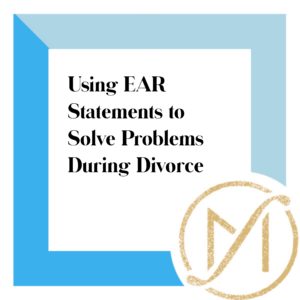Using EAR Statements to Solve Problems With Your Ex During Divorce
 We all get upset sometimes. When we are in the middle of a divorce, we tend to get more upset than usual.
We all get upset sometimes. When we are in the middle of a divorce, we tend to get more upset than usual.
It’s okay.
Emotions are a critical part of our humanity and part of what makes life beautiful. But we also need to avoid the problems that come with being too upset. One of the things about emotions is that they are contagious. If you’re in a good mood, you can bring people up. On the other hand, if you’re irritable, you can bring people around you down.
When we harness the contagiousness of emotions to help calm each other down when we are upset or angry, we create more room to focus on solving problems (ideally together).
By the way – this is not to suggest that you accept someone else’s bad behavior. It’s a method where you decide how you will respond and act in order to set up the best possible opportunity for problem-solving.
So how do help someone turn their negative emotions positive? Bill Eddy – a guru in the divorce conflict resolution world, developed the concept of EAR Statements. You can use these statements with your ex, with your work colleagues, with your kids – you can even use them on yourself. You can use them when a person is upset with a situation or a person in their lives – even (or especially) when that person is you.
Your divorce lawyer will likely do much of the negotiating during your divorce or if another issue arises post-judgment, but that shouldn’t stop you from learning this skill. Conversations between you and your ex are often not only inevitable (especially if you’re co-parenting children) but, in many cases, can be extremely helpful in finding solutions. Plus, the better you get at these skills, the easier handling future conflicts will be — not just with your ex but throughout your other relationships.
Here’s how it works.
What Is an EAR Statement?
“EAR” stands for:
Empathy
Attention
Respect
Empathy
Dr. Brené Brown says: “All I know is that my life is better when I assume that people are doing their best. It keeps me out of judgment and lets me focus on what is, and not what should or could be.”
We can have empathy for someone’s situation, even if we don’t share their feeling and/or don’t agree with their reaction. Here are some phrases that Bill Eddy suggests can express your empathy.
- “I hear how difficult this is.”
- “I really want to help you.”
- “I can see how important this is to you.”
Don’t lie, and don’t suggest you know exactly what they are feeling. Instead, acknowledge and connect with what they are experiencing.
Attention
Let people know that you are listening, and then listen. Upset people want to feel heard, so commit to listening and then follow through.
Here are some of Bill Eddy’s examples of how to demonstrate your attention:
- “Tell me more. I want to understand.”
- “I will listen as carefully as I can.”
Note that you don’t want to imply that you are taking on solving their problems for them. You are connecting, offering to listen, and then following through on your commitment.
Respect
You may not respect the person’s position or their actions, but identify something you do respect and share it with them. People’s perspective that they are disrespected fuels a lot of their anger and upset, so demonstrating truthful respect goes a long way.
Here are some Bill Eddy examples:
- “I respect your relationship with our child, and I will support your time with him/her.
- “I respect your efforts to solve this problem.”
Using EAR Statements When Your Ex Is Upset With You
EAR Statements can be extremely effective even when the upset person is upset with you. There are two keys to making sure that you don’t get defensive.
Own Your 100% Responsibility for Your Actions
First, remember that no interaction between two people is 50%/50%. Instead, there are two 100%s. In other words, you are 100% responsible for your actions, and the other person is 100% responsible for their actions.
The Four Agreements and EAR Statements
Second, remember don Miguel Ruiz’ Four Agreements.
- “Be impeccable with your word.” Say only what you mean, and don’t use your words to cause fear or pain in the other person.
- “Don’t take anything personally.” Nothing that the other person does is because of you. It’s because of their own perception of the world and themselves. Don’t be defensive – it’s not about you.
- “Don’t make assumptions.” Don’t assume that you know exactly how the other person feels. Communicate as clearly as you can to avoid misunderstanding and more upset. State facts, not opinions. Don’t jump ahead and try to solve the problem.
- “Always do your best.” Just as the other person is doing their best, know that you are too. Your best won’t always be the same.
Further Reading on Problem-Solving with Your Ex
This is just a taste of how to use EAR Statements to problem solve with your ex during your divorce (or post-divorce, especially when you’re co-parenting.
Here some additional resources:
- Meghan Freed, BATNA in Divorce
- Bill Eddy, Calming Upset People With EAR: How Statements Showing Empathy, Attention, and Respect Can Quickly Defuse a Conflict
- Daring Greatly: How the Courage to Be Vulnerable Transforms the Way We Live, Love, Parent, and Lead
- don Miguel Ruiz, The Four Agreements
If you want any of these books, let us know. We will send it to you, on us.








